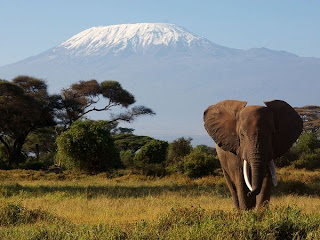 Hemingway's tale is only made more disconcerting by its autobiographical elements. As I was reading, I couldn't help continually repeating that old track in my head, the one that plays in all humans' heads at a some point of trivial enlightenment: "What if I died tomorrow?"
Hemingway's tale is only made more disconcerting by its autobiographical elements. As I was reading, I couldn't help continually repeating that old track in my head, the one that plays in all humans' heads at a some point of trivial enlightenment: "What if I died tomorrow?"
"He had been in it and he had watched it and it was his duty to write of it; but now he never would."
Many people live life recklessly, thinking "YOLO! Gotta take advantage of this world while I can." But as is said, you won't regret the things you did as much as the things you didn't do. The Snows of Kilimanjaro was a bit scary to read with my own life in perspective. Have I done and not done all the things that make me feel best? Hemingway certainly expresses his uniquely Hemingway-blunt outlook for his readers. Its so honest, it cuts right to the core of being human and gives the reader a perspective of himself... whenever this self-reflection happens, there is hope. Though granted Hemingway's character died in the end, he died with hope and leaves us to the promise of our own lives.
I loved it.
I loved it.
Ha love the title, Debbi.
ReplyDeleteI also couldn't help but relate to the story as I was reading it. Being USF students, we can also take it in a theological direction. It seems to me that there a lot of Christians that are lax in living a Christian lifestyle, possibly thinking, "Well, yeah, I'm screwing up now, but someday I will do better." I have to admit I've fallen into that trap before. It's important to keep in mind that we may not have that tomorrow we're waiting for. If we want to be remembered a certain way, we have to start working for it now, because we might not get the chance to later.
It was definitely my favorite of that group of readings.
I, too, really enjoyed this short story. The main character died failing to accomplish his goals and failing to live up to the type of person he intended to be. Although it is rather sad, it does leave the reader with a sense of hope, if not only because it demonstrates how to not live.
ReplyDelete